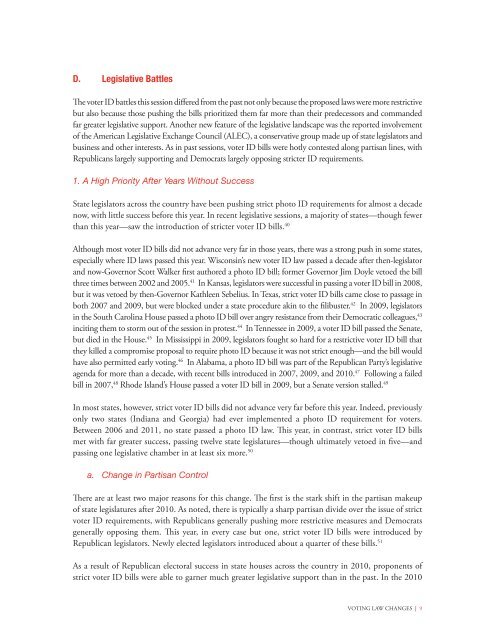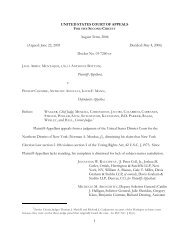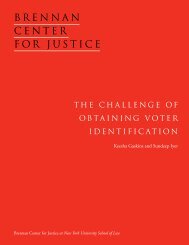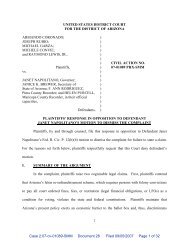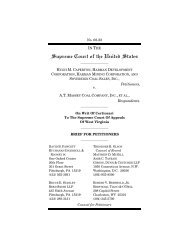BRENNAN CENTER FOR JUSTICE
BRENNAN CENTER FOR JUSTICE
BRENNAN CENTER FOR JUSTICE
You also want an ePaper? Increase the reach of your titles
YUMPU automatically turns print PDFs into web optimized ePapers that Google loves.
D. Legislative Battles<br />
The voter ID battles this session differed from the past not only because the proposed laws were more restrictive<br />
but also because those pushing the bills prioritized them far more than their predecessors and commanded<br />
far greater legislative support. Another new feature of the legislative landscape was the reported involvement<br />
of the American Legislative Exchange Council (ALEC), a conservative group made up of state legislators and<br />
business and other interests. As in past sessions, voter ID bills were hotly contested along partisan lines, with<br />
Republicans largely supporting and Democrats largely opposing stricter ID requirements.<br />
1. A High Priority After Years Without Success<br />
State legislators across the country have been pushing strict photo ID requirements for almost a decade<br />
now, with little success before this year. In recent legislative sessions, a majority of states—though fewer<br />
than this year—saw the introduction of stricter voter ID bills. 40<br />
Although most voter ID bills did not advance very far in those years, there was a strong push in some states,<br />
especially where ID laws passed this year. Wisconsin’s new voter ID law passed a decade after then-legislator<br />
and now-Governor Scott Walker first authored a photo ID bill; former Governor Jim Doyle vetoed the bill<br />
three times between 2002 and 2005. 41 In Kansas, legislators were successful in passing a voter ID bill in 2008,<br />
but it was vetoed by then-Governor Kathleen Sebelius. In Texas, strict voter ID bills came close to passage in<br />
both 2007 and 2009, but were blocked under a state procedure akin to the filibuster. 42 In 2009, legislators<br />
in the South Carolina House passed a photo ID bill over angry resistance from their Democratic colleagues, 43<br />
inciting them to storm out of the session in protest. 44 In Tennessee in 2009, a voter ID bill passed the Senate,<br />
but died in the House. 45 In Mississippi in 2009, legislators fought so hard for a restrictive voter ID bill that<br />
they killed a compromise proposal to require photo ID because it was not strict enough—and the bill would<br />
have also permitted early voting. 46 In Alabama, a photo ID bill was part of the Republican Party’s legislative<br />
agenda for more than a decade, with recent bills introduced in 2007, 2009, and 2010. 47 Following a failed<br />
bill in 2007, 48 Rhode Island’s House passed a voter ID bill in 2009, but a Senate version stalled. 49<br />
In most states, however, strict voter ID bills did not advance very far before this year. Indeed, previously<br />
only two states (Indiana and Georgia) had ever implemented a photo ID requirement for voters.<br />
Between 2006 and 2011, no state passed a photo ID law. This year, in contrast, strict voter ID bills<br />
met with far greater success, passing twelve state legislatures—though ultimately vetoed in five—and<br />
passing one legislative chamber in at least six more. 50<br />
a. Change in Partisan Control<br />
There are at least two major reasons for this change. The first is the stark shift in the partisan makeup<br />
of state legislatures after 2010. As noted, there is typically a sharp partisan divide over the issue of strict<br />
voter ID requirements, with Republicans generally pushing more restrictive measures and Democrats<br />
generally opposing them. This year, in every case but one, strict voter ID bills were introduced by<br />
Republican legislators. Newly elected legislators introduced about a quarter of these bills. 51<br />
As a result of Republican electoral success in state houses across the country in 2010, proponents of<br />
strict voter ID bills were able to garner much greater legislative support than in the past. In the 2010<br />
voting LAW CHANGES | 9


